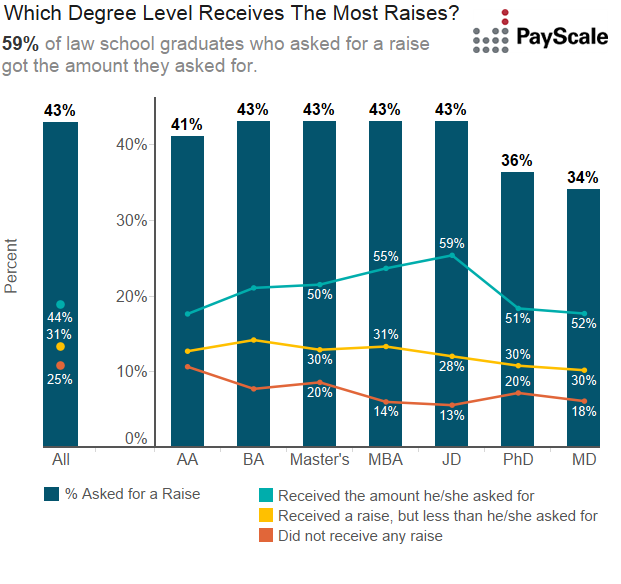Motivation
How to Negotiate Like a Lawyer
Here are five steps to unleashing your inner attorney.
Posted November 17, 2015
Earlier this year, Payscale released the results of a survey measuring (1) who attempts to negotiate a raise at work, and (2) who actually receives it.

The survey takes into account employees holding Associates' Degrees, Bachelor's Degrees, Master's Degrees, Business Degrees (MBAs), Law Degrees (JDs), PhDs, and Medical Degrees (MDs). The group most likely to successfully negotiate a raise is—by far—the group of attorneys. And perhaps this is to be expected, because negotiations play such a crucial role in an attorney's life. A lawyer who cannot negotiate is a lawyer who has a problem.
However, everyone can benefit from improved negotiation skills—not only to ask for raises, but also in their business and casual relationships, in making purchases, or simply in handling disagreements. Here are five important negotiation strategies that law schools tend to teach:
1. Prepare Thoroughly
Lawyers are taught to prepare thoroughly for any negotiation. If you are going into a conversation asking for something, you want to be able to back up your requests or demands. You also want to know your position clearly. If you fail to prepare, you're preparing to fail.
For legal matters, the term "bargaining under the shadow of the law" means that when two litigators negotiate with each other, both have—in the back of their minds—what the potential, likely trial outcome would be. And this information will inform their negotiations. A lawyer will only agree to a settlement offer if that settlement offer is preferable to going to trial, and a lawyer will only know that information if she or he goes into a negotiation fully informed and educated.
How does this help everyday negotiations by non-lawyers? The principle is similar. Whenever you negotiate, you should do so with your next best option in mind. This is called the "BATNA," or the "best alternative to a negotiated agreement." It is the course of action that will be taken by a party if the current negotiations fail and an agreement cannot be reached. You can improve your position as a negotiator by developing a very strong BATNA beforehand. For example, let's say I want to buy an iPad from my friend. I will buy it from him if he offers me a good deal, but my BATNA is to buy a new iPad from the store. If I learn that the Apple store will soon have a sale, then my BATNA will have improved and I have a better position as a negotiator. But without researching this beforehand, I would not be aware of the sale, and therefore my BATNA would be weaker.
Once you know what your BATNA is, you can determine what your walk-away point is. This is something to be determined as part of your preparation, and not during the heat of argument.
2. Plan the Negotiation
"Planning the negotiation" means deciding beforehand with the other side what the format of the negotiation will be. For example, you may agree that you will go first, and discuss your position, goals, what you have to offer, and your perspective on the situation. Then the other side will go. Both of you can agree not to interrupt each other. This way, you can avoid unnecessary interruptions and both sides will be assured the opportunity to speak.
3. Empathize Sincerely
When the other side is speaking, use that opportunity to listen intently and try to understand his perspective or position. Among other things, this will help you understand where the two of you may overlap in goals, where there may be room to push, or where you differ irreconcilably such that there may be a hold-out.
Do not spend the entire time planning your response while the other side is speaking. Genuinely try to understand where they are coming from.
4. Assert Respectfully
When it is your turn to speak, use it as an opportunity to put forth your thoughts and perspectives in a clear way. Do not use it as an opportunity to tear down the perspectives or views of the other side. Your goal is to convey to the other side what you expect, what your position is, and what your view of the situation is.
When it comes down to coming together for a compromise for a solution, keep your BATNA in mind and keep your values in mind. But be willing to be flexible about other things. Remember that "winning" a negotiation is not necessarily getting everything you want or even getting more than the other side, it is getting something that is better than your BATNA.
5. Implement the Solution
Once you have agreed upon a compromise, solution, or deal, the next step is to commit on how that deal is to be implemented. This means knowing what to do next to make your agreement a reality. For example, in litigation, implementing the solution usually means that the defendant will pay the plaintiff money, or make promises, in return for the lawsuit to be dropped. Implementing the solution is ensuring that these steps are actually effectuated.
Lawyers, especially on television, have a reputation for "playing hardball", negotiating without compromise, launching personal insults, engaging in intimidation tactics, or perhaps "steamrolling" the other side. In reality, this usually does not end well for either side. Value is created when people listen to each other, when they create dialogue, and when they share information. That is how lawyers are encouraged to negotiate, and that is how you should negotiate, too.
Special thanks to Mark A. Johnson of Stoel Rives LLP for sharing his insights and experiences in negotiation.
Disclaimer: This article is for informational purposes only and not for the purpose of providing legal advice. You should contact your attorney to obtain advice with respect to any particular issue or problem. Use of and access to this blog or any of the e-mail links contained within the site do not create an attorney-client relationship between the author and the user or browser. The opinions expressed at or through this site are the opinions of the individual author and may not reflect the opinions of any law firm or Psychology Today.




